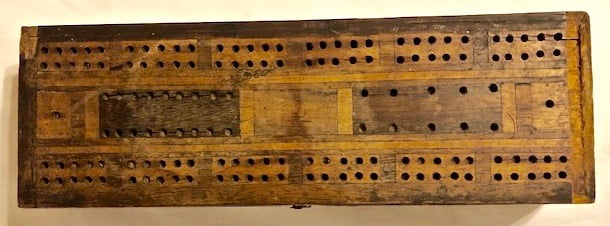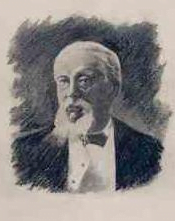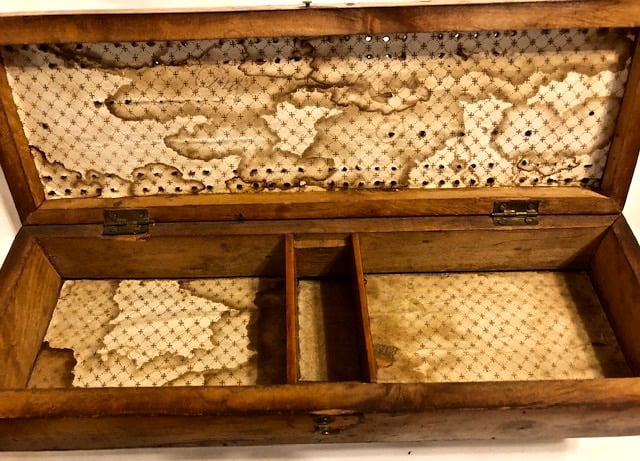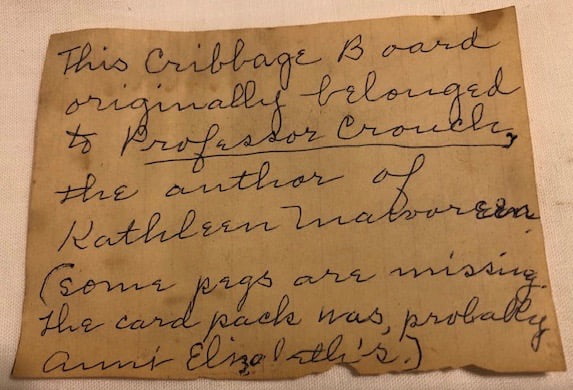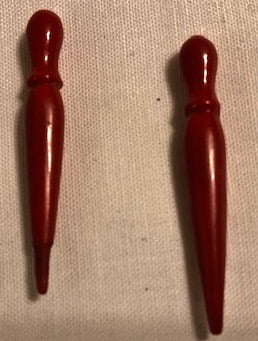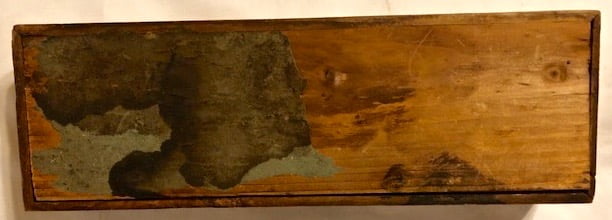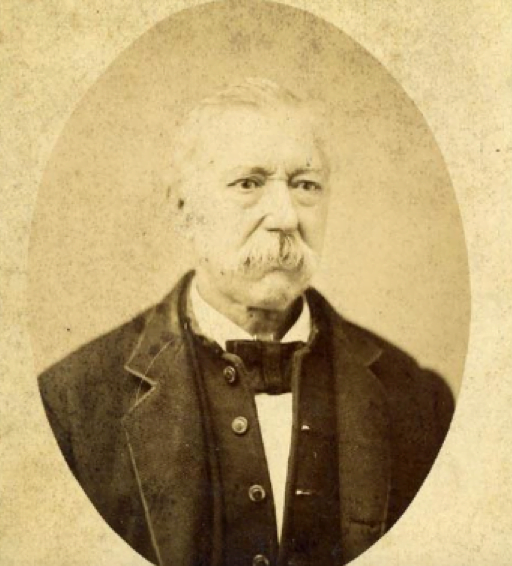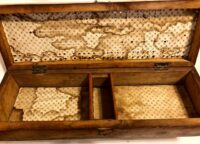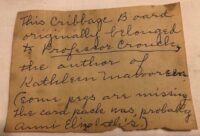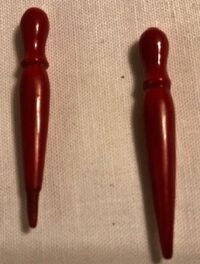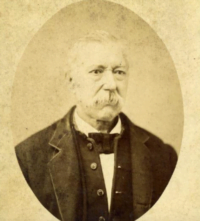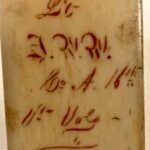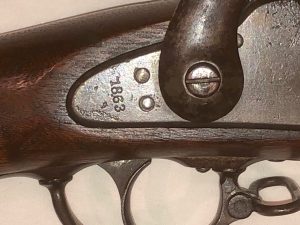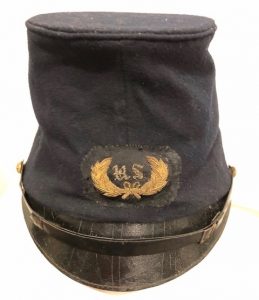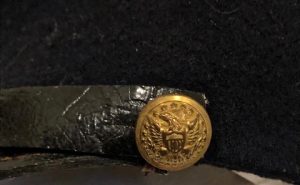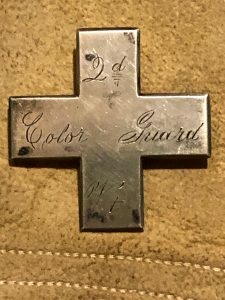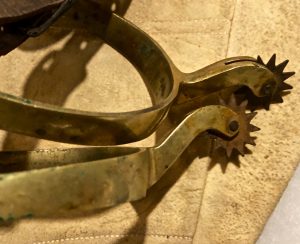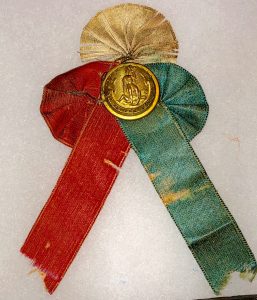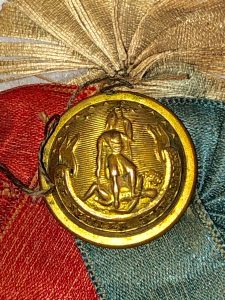Id’d Cribbage Board Carried during the Civil War by Prof. Frederick Nicholls Crouch – Bugler of the Richmond Howitzers
SOLD
Id’d Cribbage Board Carried during the Civil War by Prof. Frederick Nicholls Crouch – Bugler of the Richmond Howitzers – Civil War period cribbage board with a period note indicating that this game board and two original pegs, were the wartime possessions of the renown 19th century composer, Professor Frederick Nicholls Crouch. The acclaimed composer of over 2000 ballads and two operas, Crouch was born in England in 1808; he emigrated to America, in 1849 where he found employment at Richmond, Virginia’s St. Paul’s Episcopal Church. At the start of the Civil War, he joined the Richmond Howitzers Battalion, in the Army of Northern Virginia and served as a bugler throughout the entire war. Crouch composed his most famous and haunting song, “Kathleen Mavourneen” which quickly became a favorite of the Confederates and was sung around the soldiers’ campfires almost nightly. The song was featured in the 1994 film “Gettysburg”, and it was sung in the Confederate camp the night before Pickett’s Charge. Following the war, Crouch went on composing as well as teaching music and singing. There has been controversy about the authorship of the song “Oh how I hate to get up in the morning”, some saying that Irving Berlin composed it and others equally adamant that Crouch had the honors. Recent research has shown that Crouch was the actual composer, writing the song to cheer up his fellow Confederate soldiers. Frederick Nicholls Crouch moved his residence to Portland, Md., shortly after the war’s end. He died there on August 18, 1896 and was buried with honors on Confederate Hill in Baltimore’s Loudon Park Cemetery.
Frederick William Nich. Crouch
| Residence Richmond VA; a 52 year-old Singer & Composer. Enlisted on 4/19/1861 at Richmond, VA as a Private. On 4/19/1861 he mustered into “G” Co. VA 12th Infantry He was discharged on 7/6/1861 On 11/12/1861 he mustered as a substitute into “1st” Co. VA 1st Co. Howitzers Light Artillery (date and method of discharge not given) (Enlisted at Leesburg, VA) Promotions: * Bugler Other Information: born 7/31/1808 in London, England died 8/18/1896 in Portland, ME Buried: Loudon Park Cemetery, Baltimore, MD After the War he lived in Richmond, VA & Baltimore, MD |
1st Co. Howitzers VA Light Artillery Battery
| Organized: Richmond, VA on 4/21/61 Mustered Out: 4/8/65 |
| From | To | Brigade | Division | Corps | Army | Comment |
| Jul ’61 | Jul ’61 | Bonham’s | Army of Potomac | |||
| Jul ’61 | Aug ’61 | Bonham’s | 1st | Army of Potomac | ||
| Jan ’62 | Feb ’62 | Artillery | Forces at Dumfries, VA | Potomac District | Dept of Northern Virginia | |
| Apr ’62 | May ’62 | Griffith’s | McLaws’ | Magruder’s | Dept of Northern Virginia | |
| May ’62 | May ’62 | Griffith’s | Magruder’s | Dept of Northern Virginia | ||
| Jun ’62 | Jul ’62 | Griffith’s | Magruder’s | Magruder’s | Army of Northern Virginia | |
| Jul ’62 | Sep ’62 | Griffith’s/Brarksdale’s | McLaws’ | 1st | Army of Northern Virginia | |
| Sep ’62 | Jul ’63 | Artillery | McLaws’ | 1st | Army of Northern Virginia | |
| Jul ’63 | Sep ’63 | Cabell’s | Artillery | 1st | Army of Northern Virginia | |
| Sep ’63 | Mar ’64 | Cabell’s | Reserve Artillery | Army of Northern Virginia | ||
| Mar ’64 | Apr ’65 | Cabell’s | Artillery | 1st | Army of Northern Virginia |
Frederick William Nicholls Crouch emigrated from England to America in 1849, abandoning a career as a musician of no small repute. He sang in the choir of St. Paul’s Cathedral in London, played viola and cello before royalty, and composed operas and Irish melodies. Crouch eventually settled in Richmond, and when the War Between the States began, the 52-year-old musician took up arms in defense of his adopted country. He enlisted in the Richmond Howitzers and served the entire four years of the conflict.
Crouch relocated to Baltimore around 1871 and took up choral conducting. He is buried on Confederate Hill in Baltimore’s Loudon Park Cemetery.
Acclaimed composer of over 2000 ballads and two operas. Born in England in 1808, he emigrated to America in 1849 where he found employment at Richmond, Virginia’s St. Paul’s Episcopal Church. At the start of the Civil War, he joined the Confederacy and he was in the Confederate Army throughout the entire war, serving with distinction. Crouch composed his most famous and haunting song, “Kathleen Mavourneen” which quickly became a favorite of the Confederates and was sung around the soldiers’ campfires almost nightly. The song was featured in the 1994 film “Gettysburg” and it was sung in the Confederate camp the night before Pickett’s Charge. It is still heard frequently to this day. Following the war, Crouch went on composing and he also taught music and singing. There has been controversy about the authorship of the song “Oh how I hate to get up in the morning”, some saying that Irving Berlin composed it and others equally adamant that Crouch had the honors. Recent research has shown, however, that Crouch was the actual composer, writing the song to cheer up his fellow Confederate soldiers. Frederick Nicholls Crouch was buried with honors on Confederate Hill in Baltimore’s Loudon Park Cemetery.
CROUCH, Frederick Wm. Nicholls–authored Kathleen Mavourneen and 2,000 ballads, 2 operas. Was a musician of note in London; came to America in 1849; lived a time in Portland, Maine; was in Richmond 1861 and at age 53 joined First Richmond Howitzers; went through to Appomattox; moved to Baltimore, MD 1871 and remained here but visited Portland, and died there August 18, 1896; a niece accompanied his body to Baltimore where he is buried at Confederate Hill in Loudon Park Cemetery; estimated 500 attended burial services at which “Kathleen Mavourneen” was sung. Married 4 times; 16-17 children, or 27, according to various sources. Death notice in Baltimore paper came from a Portland source and cited “memoir” Professor Crouch had written.
Frederick Crouch
Frederick Nicholls Crouch (30 July 1808 – 18 August 1896) was an English composer and cellist.
Crouch was born in Marylebone in London. He emigrated to the United States in 1849 and settled in Richmond, Virginia. During the Civil War, Crouch took up arms for the Richmond Grays and the 1st Richmond Howitzers, Confederacy.
Crouch was noted as a fine cellist, having played in the King’s Theatre as well as St Paul’s Cathedral in London, before coming to the United States, but the majority of his compositions were not successful. His most famous song is “Kathleen Mavourneen“. During his years in the United States, Crouch composed two operas and unsuccessfully tried various musical undertakings (i.e., conducting, singing and teaching). Well traveled after the Civil War, Crouch eventually settled in Baltimore, Maryland.
He died 18 or 19 August 1896 in Portland, Maine, and was buried on Confederate Hill in Baltimore’s Loudon Park Cemetery
Frederick Nicholls Crouch was an English composer, music teacher and cellist. While writing music all his life, Crouch only managed one hit song. It was popular during the Civil War. He taught music in Portland for a while, had a particular fondness for snakes and has got to be one of the strangest cats to ever call this city home.
He was born 209 years ago this week, on July 30, 1808.
Crouch was born in Marleybone, London. He wrote the music for a song called “Kathleen Mavourneen” in 1837. Later, it became a standard in the south during the Civil War. It’s included in Michael Shaara’s historical novel “Killer Angels” and its movie adaptation “Gettysburg.” It’s said to have been popular amongst both enlisted men and officers alike. Pickett’s men were said to have sung it around their campfires the night before their ill-fated charge. The song is still sung today.
Calling himself Professor F. Nicholls Crouch, one music historian wrote of his arrival in Portland sometime in the 1840s:
“He appeared on our horizon with a big blast of trumpets blown by himself.”
Apparently, Crouch fancied himself as quite a gift to this backward little seaport. He dressed in an ostentatious, regal manner and carried himself with overbearing English airs. He was not popular.
On top of this, there was the snake thing. He had hundreds of them crawling around the studio where he gave music lessons. He was also known to carry them in his pockets and up his sleeves when he strolled around town.
At one point, in 1850, Portland’s Sacred Music Society offered him the job of choral director. But later, they rescinded their offer for some reason. Incriminations, recriminations and lawsuits ensued and dragged on for some time.
Frederick Nicholls Crouch (Photo courtesy of the Music Division, The New York Public Library)
When the Civil War broke out, he abandoned Portland and joined the Richmond Howitzers Battalion in the Army of Northern Virginia. He served as a bugler throughout the war.
After the war, he presumably lived off the sheet music royalties from “Kathleen Mavourneen.” He wrote two operas. Both were flops.
For some reason, he ended up back in Portland near the end of his life. He died here on August 18, 1896.


